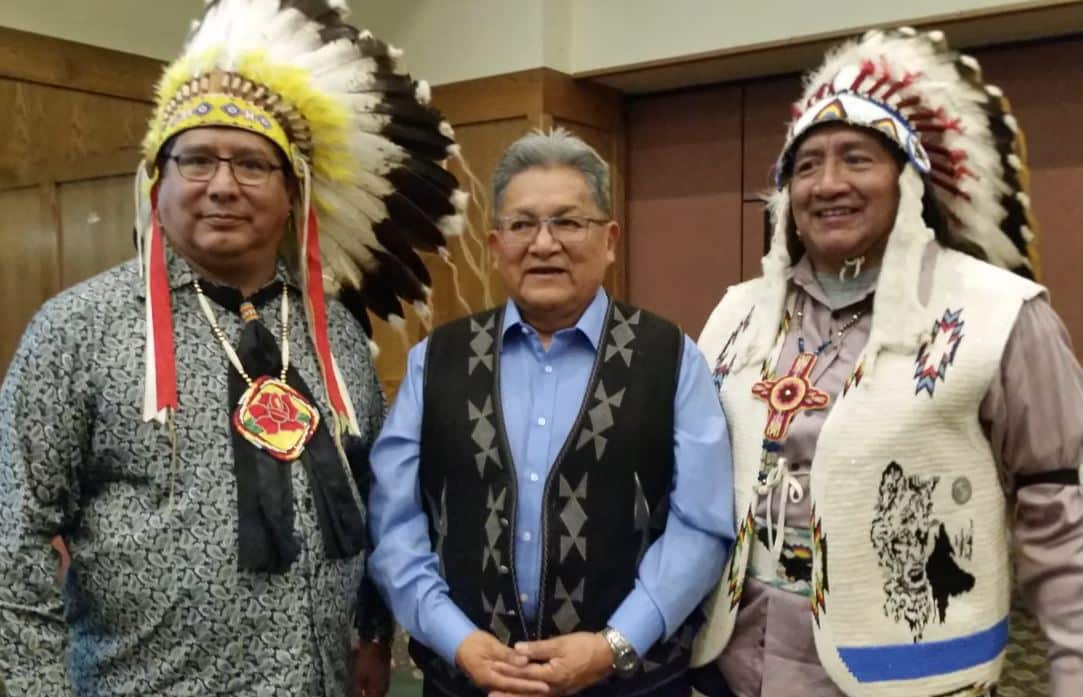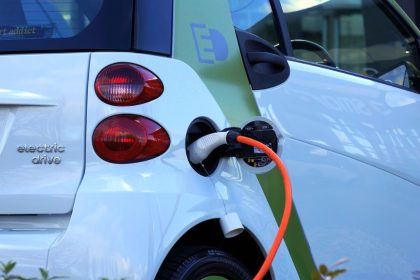Navajo and Hopi Tribes Push for Equitable Renewable Energies for Northern Arizona

A recently released documentary is showing how the Navajo Nation and Hopi Tribes are pushing for equitable and renewable energy sources for the many people living without electricity in the Black Mesa territory of northern Arizona.
“Local Leadership, Global Change: Navajo Nation & Hopi Tribe,” produced by the Institute for Energy Economics and Financial Analysis, is a documentary which covers the multi-decade journey of the Navajo Nation and Hopi Tribes as they push to shut down and reclaim the land utilized by the Black Mesa coal mining facility, as well as provide for the people whose lives have been changed by their multiple decades of water-dependent operations.
“The mission is to accelerate the transition to a more diverse, sustainable and profitable energy economy. So IEEFA, in the past, has worked with local organizations such as Tó Nizhóní Ání,” Wilda Anagal, research fellow at the IEEFA, said. “And this video was selected as part of the inspirational videos they wanted to bring awareness to, and also to display what other organizations are working on, or what they are doing on the ground.”
Exhaustive water usage by the mining facility, which is owned by Peabody Energy, the largest private sector coal company in the world, spawned protests, marches, internet craze and the inception of the multi-tribe advocacy organization, Tó Nizhóní Ání in the early 2000’s.
“The translation literally means, Sacred Water Speaks. And it is in reference to the only source of potable drinking water that is available to people who reside on Black Mesa,” Jessica Keetso, a four-year community organizer for Tó Nizhóní Ání, said.
Tó Nizhóní Ání was on the frontlines of protests against environmentally harmful energy production in the Black Mesa region all the way up until the Black Mesa coal facility shut down in 2005. Now, they are pushing Peabody Energy, the federal government, and surrounding states to provide aid for land reclamation processes they say were promised in the original contractual agreements between Peabody Energy and the Navajo Nation.
“The amount of water that they used in both quality and quantity should be returned to us,” Keetso said. “That was what people agreed to at the time.”
Such a task may be met with skepticism, however, as according to documentary sources the pipeline that ran the 273 miles between the Black Mesa mine and the Mojave Generating Station used upwards of three million gallons-a-day just for coal transportation. The amount of water used by Peabody Energy within this one mine, despite fluctuations over operation’s history, is calculated by the United States Geological Survey to have been more than 71 billion gallons of water from 1965 to 2005.
Returning such an amount of water to a relatively desertified area, one that is already in drought and largely without the infrastructure to support such a task, poses serious logistical issues for a company already filing bankruptcy. However, this doesn’t stop Tó Nizhóní Ání from pushing for what they believe is fair.
“It’s not a matter of what’s possible, it’s a matter of what’s right. It is something that should be owed to us. Our community sacrificed so much,” Keetso said. “But in terms of the infrastructure, if we can’t even get water to our own people, then you know from the Navajo Nation side that kind of infrastructure is not possible.”
“But it should be possible for Peabody. It should be possible for the company,” Keetso continued. “They made a lot of money from us.”
Many of the members of the organization have been watching the water supply on tribal land dwindle for years now. Crops don’t grow like they used to. People who once had bountiful access to groundwater now must travel to town for access to fresh water. The environment has changed, and for the people of Black Mesa, it was far worse.
“I have been working on the issue of reclamation of the coal mines on Black Mesa, on our aboriginal lands,” Ben Nuvamsa, the former chairman of the Hopi Tribe said in the documentary. “The old ecology has been impacted, and that needs to be brought back to pre-mining conditions. The federal government appears not to be concerned about reclamation, and neither is the coal mining company.”
Despite the Black Mesa strip mining operation shutting down in 2005, much of the land has yet to be reclaimed. Coal production primarily switched over to the nearby Kayenta mine, which had far less notoriety, but also came to shut down in 2019 as Peabody continued to face growing financial problems. Prospects of a company-led reclamation are slim considering Peabody Energy filed bankruptcy in 2016 and threatened to do so again in 2020 following a growing departure from coal-based power. The federal government has been, according to those interviewed in the IEEFA documentary, slow to provide aid to the inhabiting tribes.
Compounding the situation, according to Keetso, is a lack of accountability on the part of the Navajo Nation and the Navajo Tribal Utility Authority, or the branch of the Navajo government that decided what to do with the energy produced by the Black Mesa mine.
“I would say it has not been managed well… They’ve been in operation for about sixty years, and people still don’t have electricity in their homes. The more I’m learning about NTUA, the more I am just asking what they’ve been doing for so long. They get money from the Navajo Nation; they get federal money. So, what is taking so long?”
Now, members of Tó Nizhóní Ání and other tribal organizations are pushing for a real shift in the way energy is produced. Wind and solar appear to be the two strongest candidates, as the vast open areas of the Black Mesa territory would provide ample space for both.
Several chapters of the Navajo Nation have already been selected for development of these renewable energies, according to Keetso, but she worries that current energy policies of Navajo Nation President Jonathan Nez mean the energy produced in these areas won’t actually make it to the places which need them.
“It should be done sustainably and equitably, and it should be just for the chapters, and for the people. Right now, if we continue the same route as Jonathan Nez is going, where he is just snatching up areas, huge chunks of land from these communities, and having people waive their rights to use their land without being compensated in any way,” Keetso said. “If he just goes along with his agenda, then it is going to follow the same business model, the same extractive, exploitative behavior that exists right now between the Navajo Nation, the Navajo communities, and with companies like Peabody, or with natural gas, uranium, or oil.”
Regardless of both the plausibility of reclamation and current level of accountability from the involved parties, organizations like Tó Nizhóní Ání have remained fierce in their fight to restore their aboriginal lands. They continue to support renewable energies for use on the Black Mesa territory and call for action from those in charge of the processes to do the right thing. Their story, in essence, is of a people pushing to reclaim their homeland from a status set by the failures of their government and the businesses their government has negotiated with.























